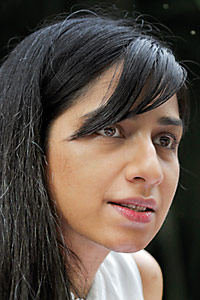A helping hand from the Global Fund for Children

Kulsoom Khan
Her travel plans include a trip to Trincomalee but Kulsoom Khan is not here on vacation. As Programme Officer-South Asia, for the US based non-profit organisation called The Global Fund for Children (GFC), flying in from Washington DC, her week-long stay in Sri Lanka is packed with visits to three local non-profit entities currently receiving grants from GFC.
“We’ve been funding organisations around the world since 1993,” she says, explaining that GFC looks for non-profit set-ups working organically among communities.
GFC’s funding isn’t indefinite, but works on issuing “small, unrestricted grants” to partners over the course of around five years. “Our success” she says, “is leaving an organisation which has taken root.”
Either investing to generate self-funding or continuing meaningful work to attract other major donors, the ultimate aim she says is encouraging initiation and continuation of eliminating social problems.
“Sri Lanka is seen as the most developed” in the region in its post-war, post-tsunami context, however she says “there are still pockets” where children’s welfare hasn’t progressed adequately.
Perhaps not as blatant as in India and Pakistan where Khan spent years of her early life, but she notes, “sexual abuse, child labour, illiteracy and alcoholism in the family plague youngsters in the tea estates.”
It’s complicated addressing children’s issues where the social framework is culturally not child-friendly. Which is why she bears a deep appreciation for partners like The Sunshine Charity in Trincomalee.
“It is difficult work to impose values in an already strong community and be accepted for it, but they’ve been doing consistently well,” she observes.
Created in 2004 post-tsunami, the GFC funds the Sunshine centre where education is made available to children. “They’ve gotten by well” she notes, having worked together for the past six years.
A partner of three years is the Ease Foundation in Battaramulla. Initially addressing the learning needs of autistic children, they now also work with differently abled children and include parents, siblings, caregivers in their unique teaching model, which gears them to be the child’s support system.
Public service videos are also produced to get their point across. “Empathy is key” she feels, and the work done by Ease is a working model in cultivating it.
Recdo, a Trincomalee-based organisation GFC has helped for three years, provides schooling for underprivileged children in an innovative manner. “The families provide man-power to build the schools,” after which they ensure children of the community routinely attend it.
“Parents feel equally invested in their children’s education which continues well into their youth,” she says. Computer skills and financial management etc are taught to promote a better standard of life.
Khan’s first visit to Sri Lanka was last year, and seeing the glaring differences between Colombo and Trincomalee, she feels there’s such a need for education and development which has to come from within the community, as opposed to being imposed.
Social innovation is the answer she says, noting that the youth voice in Sri Lanka isn’t loud enough. Led by young people, the Youth Parliament in India and its contemporary in Pakistan play a vital role in addressing issues in their respective countries.
Growing-up in Pakistan, she says, the sight of “development” was common in the form of new roads and buildings but infrastructure meant little when the number of beggars, and slum dwellings kept increasing for Khan, whose own activism against sexual abuse in a culture-sensitive background started in high-school.
Although not an encouraged career choice in the region, “I thought, for some reason I could change things and help people if I became a lawyer.”
Today, social entrepreneurship allows innovative use of business models to trigger change. There’s much untapped potential for innovative minds with the passion for change, and there’s help extended by organisations like the GFC.


